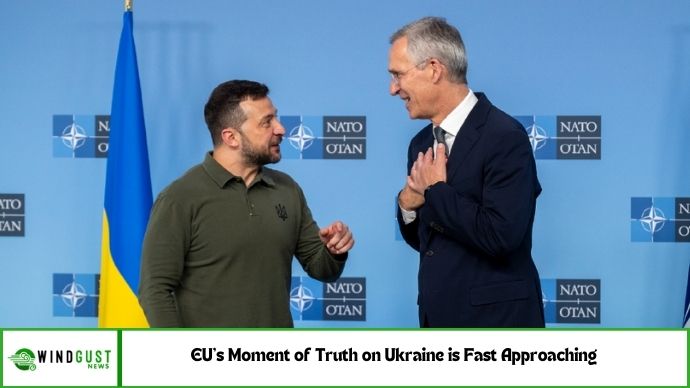EU’s Moment of Truth on Ukraine is Fast Approaching As the war in Ukraine rages on, the European Union finds itself at a pivotal crossroads. The decision to integrate Ukraine into the EU is no longer a distant prospect but a looming challenge that could reshape the continent’s future. With Ukraine pressing for membership and the EU grappling with the implications, Europe’s moment of truth is fast approaching. What will this mean for the EU, Ukraine, and the geopolitical landscape at large?
This article examines the EU’s role in Ukraine’s path toward membership, the obstacles it faces, and why this decision will define Europe’s future. As Ukraine strives to move closer to the EU, both opportunities and challenges lie ahead. Let’s dive into what these are and why they matter.
Ukraine’s EU Membership Aspirations: A Long Journey
Ukraine has long sought closer ties with the European Union, and its aspirations for full membership gained new urgency after Russia’s 2014 annexation of Crimea and the ongoing conflict in the eastern regions of the country.
In 2022, Ukraine applied for EU membership, and the European Commission granted it candidate status, a historic moment in the nation’s path toward integration with the West. However, this journey is far from straightforward.
Key Milestones for Ukraine:
- 2014: Ukraine’s first push toward EU association after the Maidan protests.
- 2022: Ukraine formally applied for EU membership, marking a crucial turning point.
- 2023: The EU granted Ukraine candidate status, initiating the formal accession process.
While these milestones represent significant progress, Ukraine still faces substantial hurdles, both internally and in its negotiations with the EU.
The EU’s Dilemma: Balancing Expansion with Internal Challenges
As Ukraine moves closer to fulfilling the necessary criteria for membership, the EU must confront its own internal struggles. The expansion of the Union to include Ukraine, a nation with a complex political and economic landscape, requires careful consideration.
Key Challenges for the EU:
- Economic Integration: Ukraine’s economy, devastated by years of conflict, needs extensive reform and alignment with EU standards.
- Corruption and Governance: Corruption remains a persistent issue in Ukraine, and the EU will need to see substantial progress in anti-corruption measures before it can grant membership.
- Security Concerns: With the ongoing war against Russia, admitting Ukraine could have significant security implications for the entire EU.
These challenges aren’t just technical or bureaucratic—they have profound political, economic, and security ramifications for the EU as a whole.
The Geopolitical Importance of Ukraine’s EU Membership
Ukraine’s membership in the European Union would have far-reaching consequences for both the EU and global security. Geopolitically, it would signal a stronger alignment between Eastern Europe and the West, diminishing Russia’s influence in the region. But the stakes are high: If the EU embraces Ukraine, it risks angering Russia, which could further destabilize the region.
Strategic Importance for Europe:
- Eastern Expansion: A more integrated Ukraine could help secure Europe’s eastern borders, acting as a buffer against Russian aggression.
- Economic Benefits: Ukraine is rich in natural resources, and its inclusion in the EU could open up new markets and trade opportunities for both sides.
- Strengthening Democracy: The EU could play a pivotal role in consolidating democracy and governance reforms in Ukraine, encouraging other Eastern European nations to follow suit.
At the same time, the EU must balance these opportunities with the risks associated with further tension with Russia.
The EU’s Moment of Truth: What Happens Next?
As Ukraine works to meet the EU’s accession criteria, the pressure on EU leaders to make a decision grows. Europe is at a crossroads, and the choice it makes regarding Ukraine will define its role in the 21st century.
What Could the Future Hold?
- Full Membership by 2025? The EU may aim for a formal membership vote by 2025, but the path ahead is fraught with challenges.
- Negotiations on Reform: Ukraine will need to implement major reforms in governance, rule of law, and economic policies to meet EU standards.
- EU Unity: The EU must remain united in its approach to Ukraine, ensuring that all member states agree on the potential benefits and risks of expansion.
At this critical juncture, the EU must not only focus on short-term issues but also consider the long-term implications of accepting Ukraine into its fold.
Conclusion
The European Union’s decision regarding Ukraine’s membership is more than just a policy choice; it’s a defining moment in European history. The road to EU integration for Ukraine is steep and filled with obstacles, but the benefits—both for Ukraine and the EU—are immense. As the war continues, Europe’s unity and strategic vision will be tested like never before. The coming years will determine whether the EU can rise to this challenge and embrace a future that includes a free, democratic Ukraine.
Frequently Asked Questions (FAQs)
1. What is Ukraine’s current status in the EU membership process?
Ukraine was granted EU candidate status in 2023, and it is working toward meeting the necessary criteria for full membership.
2. What are the main challenges Ukraine faces in joining the EU?
Ukraine needs to address issues like economic reform, corruption, and security concerns before it can join the EU.
3. How would Ukraine’s EU membership affect European security?
Ukraine’s membership could strengthen EU borders, serve as a buffer against Russia, and contribute to regional stability.
4. When could Ukraine become a full EU member?
If all criteria are met, Ukraine could become an EU member by 2025, though this timeline depends on the pace of necessary reforms.
5. What is the geopolitical significance of Ukraine joining the EU?
Ukraine’s EU membership would align it more closely with the West, reducing Russian influence in Eastern Europe.
6. How can the EU support Ukraine’s path to membership?
The EU can support Ukraine by offering technical assistance, investment, and a clear roadmap for the necessary reforms.

